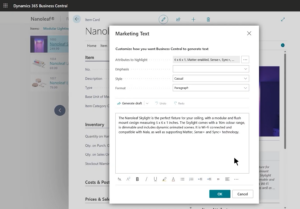
Microsoft Puts AI into ERP and CRM

(Alexander Limbach/Shutterstock)
Microsoft is leveraging its partnership with OpenAI to incorporate AI capabilities directly into its CRM and ERP products. Dubbed Microsoft Dynamics 365 Copilot, the new offerings are designed to offload clerical duties and “tedious tasks,” and will make customers’ business run more efficiently, the software giant claims.
Since OpenAI debuted ChatGPT in late November, people around the world have awestruck by the capability of large language models (LLMs) to understand questions and generate well-written responses very quickly. While the capabilities of LLMs have been known for years, ChatGPT nevertheless has spurred massive interest and investment in generative AI.
Thanks to its exclusive partnership with OpenAI, Microsoft has been at the forefront of bringing generative AI to market. While the initial rollout of its new Bing chat mode was a bit rocky, the company has pushed forward with plans to incorporate the AI capability liberally in its product base, including front-office productivity tools like Office 365.
With today’s Copilot announcement, Microsoft showed that its back-office applications will also be getting into the AI business. Seven Dynamics 365 products will be getting the Copilot treatment with this go-around, spanning sales, marketing, customer service, ecommerce, and supply chain management.
In some cases, the Copilot will completely take over work that would normally be done by a human user sitting at a Dynamics terminal. For instance, in Dynamics 365 Sales and Viva Sales, the AI software will automatically write emails on behalf of the user. In addition to automatically pulling in details from the CRM system, such as product and pricing information, the AI will also bring “insights from the recorded Teams call” to bear on the email writing process.
“With sellers spending as much as 66% of their day checking and responding to emails, this presents a significant business upside to give the seller more time with their customers,” Charles Lamanna, corporate vice president of business applications and platform at Microsoft, wrote in a blog post today.
Customer service has been the traditional stomping grounds of the conversation AI and “chatbots” that are the common output from LLMs, so it shouldn’t be a surprise to find Microsoft offering a Copilot option for its Dynamics 365 Customer Service application. With this release, Microsoft will let customers create chatbots “in minutes” from “conversation boosters.”
The intersection of traditional analytics/BI and conversational AI is an interesting place for businesses, thanks to the capability to automatically pull up analytics insights while one is having a “conversation” with an AI chatbot. To that end, Microsoft is hoping it will be a fruitful mix with the addition of Copilot to its Dynamics 365 Marketing and Dynamics 365 Customer Insights.
Microsoft says the addition of Copilot to Dynamics 365 Marketing will allow marketers to “describe their customer segment in their own words to create a target segment with the query assist feature.” It will also help marketing professionals “get inspiration for fresh email campaign content based on a simple request,” (although they might want to keep the conversations with the OpenAI codex on the short side).
Similarly, with the AI assist in Dynamics 365 Customer Insights, Microsoft is touting the ability for marketers to “curate highly personalized and targeted customer segments by having a dialogue with their customer data platform using natural language.” The ability to mix the number-crunching prowess of traditional analytics with the natural language understanding and generation capabilities of OpenAI’s deep learning system seems to have potential.
Microsoft is also applying its generative AI capabilities to its logistics and ecommerce systems. For Dynamics 365 Business Central, Microsoft is leveraging the AI to automatically generate “compelling product descriptions” for ecommerce storefronts from product attributes lists, such as color, material, and size.
Meanwhile, in its Supply Chain offerings, Microsoft is building a Copilot that will “proactively flag external issues such as weather, financials, and geography” in order to get on top of potential hiccups in logistics.
The new Copilot services use the Azure OpenAI Service, the Microsoft-hosted service that provides access to OpenAI’s technology via an API.
Related Items:
The Drawbacks of ChatGPT for Production Conversational AI Systems
Has Microsoft’s New Bing ‘Chat Mode’ Already Gone Off the Rails?
































